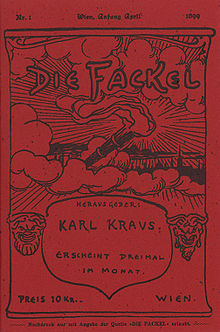卡爾·克勞斯(Karl Kraus 1874年4月28日-1936年6月12日)出生於奧匈帝國境內的基欽(Jičín),死於奧地利維也納,是二十世紀早期最著名的奧地利作家之一。他是記者、諷刺作家、詩人、劇作家、格言作家、語言與文化評論家,並且提拔了許多年輕的作家。
Fine writers do psychoanalysis
“The tyranny of necessity grants its slaves three kinds of freedom: opinion free from intellect, entertainment free from art, and orgies free from love.”
Karl Kraus
Kraus, 1874 – 1936, was an Austrian essayist, aphorist, satirist, playwright, journalist and poet. This line was published in The Karl Kraus Reader ‘In These Great Times’, 1976
Karl Kraus (April 28, 1874 – June 12, 1936) was an Austrian writer and journalist, known as asatirist, essayist, aphorist, playwright and poet. He directed his satire at the press, German culture, and German and Austrian politics. The Austrian author Stefan Zweig once called Kraus "the master of venomous ridicule" (der Meister des giftigen Spotts).[1]
Contents
[hide]On April 1, 1899, Kraus renounced Judaism, and in the same year he founded his own newspaper, Die Fackel (The Torch), which he continued to direct, publish, and write until his death, and from which he launched his attacks on hypocrisy, psychoanalysis, corruption of theHabsburg empire, nationalism of the pan-German movement, laissez-faire economic policies, and numerous other subjects.

https://en.wikipedia.org/wiki/Karl_Kraus_(writer)
------
據《たった一人の新聞社》紀錄片介紹,80歲的加藤隆男是上小阿仁報社現存的唯一員工,負責採訪、撰稿、印刷等全部工作,並堅持使用曾經支持起整個日本印刷文化的活版印刷、定期於每週日發行報紙。他感嘆地說,活版印刷應該快到盡頭了,但就算是只有他一個人,也要堅持繼續印下去,因為還是有人在等著這份報紙。

沒有留言:
張貼留言
注意:只有此網誌的成員可以留言。